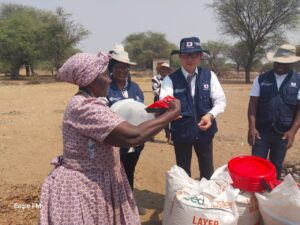
By:AnnakletaHaikera
A Japan-funded joint monitoring mission has set asideN$2 million to aid agricultural organisations in the Kavango West regionto benefit all local farmers.
This follows a visit to four projects by the Japanese Embassy this week.
The main reason for the visit was to see what farmers are doing on the ground and determine support need-based and results-oriented capacity-building intervention, including training and skill transfer opportunities targeting agriculture extension staff.
ZepeeHavarua, Chief Agriculture Officer in the Kavango West region told The Villager the money will be used by farmers in both aspects in inputs or tools and training.
According to Havarua, the aim is not only to bolster horticulture but also to see poultry and goats farmers transition to meat production.
“Small scale farmers who already have been assisted will still undergo training. The embassy is pleased with farmers because some farmers that were given tools have used it accurately and are doing very well.”
Meanwhile, Japanese Ambassador to Namibia, HisaoNishim pledged his nation’s support for Namibia, especially in the field of education and agriculture.
“These projects will be one of the projects to benefit the youth. If we don’t train the youth in farming, their lives will never be stable. This is just one part of the project that we’re doing, and it’s not only in the Kavango regions but also at the Ondangwa campuses,” the Ambassador said.
“We have been supporting agricultural projects in the past 13 years, and we always receive successful outcomes, such as incomes and creating employment,” Ambassador Nishim said.
The projects visited are Zandi Youth Garden, KaranganaPoultry Chicken, Kamakoli Farmer Associations, and Klein Musese Investment CC.
MarthiIhemba, the owner of Klein Musese Investment CC, who received gardening tools from the Japan-funded project sites, said young people should be involvedin agricultural production and be service providers and entrepreneurs.
Ihembasaid he is still faced with numerous challenges such as buyers for his products, a place for marketing, and that his fence needs a net to prevent animals from entering to eat his crops.
“I am grateful because from my garden, I generate enough income and have employed other youth to work with me,” he said.
Johannes Mukoso, another farmer at Kapako, highlighted that farmers in the region are faced with numerous challenges. One of those is that farmers are typically unnoticed in the food industry.
Mukoso said farmers have a hard time transporting their produce to markets due to a lack of roads, vehicles and money. He said they often have to carry their produce from the farm to local markets on foot. “This is because we don’t have a market where we can sell our own products.”
Early this month Japan donated N$29 million worth of cold chain equipment to strengthen Namibia’s health systems.
The donation comprises 350 vaccine carriers and 295 fridge tags, items provided to the Japanese government by UNICEF.
This is the second time the embassy visited the region.









Comments